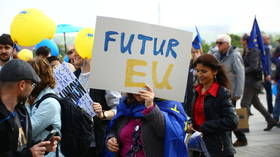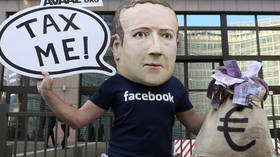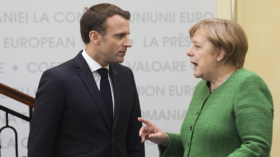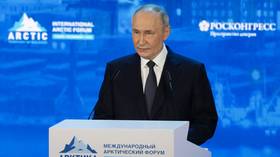‘Let down by establishment’: Voters’ anger may lead to dramatic change in European Parliament

Over the next few days, 374 million Europeans have the right to vote to elect European MPs. The most stunning result is likely to be in Britain.
40 years ago, in the first elections to the European Parliament, over sixty percent of people turned out to vote, but since then that number has declined to just barely 40 percent.
Perhaps it’s because people don’t know what the European Parliament does or think it’s no more than just a talking shop, but the simple fact is that in the last five years the Euro parliament has passed over a thousand new laws, setting new rules about immigration, farming, data protection, energy, fisheries, the environment and dozens of other issues. But we see almost nothing about these powers in our media.
Also on rt.com Farage’s Brexit Party gearing up for landslide victory in EU election as Tories sink – pollThere are 751 members of the European Parliament representing the 28 countries that make up the EU, but most reporting implies that it is the European Commission that runs the EU and makes all the laws. In fact, the commission has the right to issue regulations and directives and plays a big role in setting the agenda for debate. Effectively the commission and the European MPs collaborate and oversee the largest economy in the world.
But the issue that is going to lead the reporting on the results is going to be about the rise of the far-left and the far-right. For the last 40 years, the European Parliament has been completely dominated by the conservative group and the moderate social democrat group. Polling now suggests both these big blocks are set to lose as many as 50 seats each, with Italy’s controversial Five Star movement gaining over 20 new seats and Salvini’s EU Alliance perhaps surging to seventy gains.
The most stunning result is likely to be here in Britain where out of our 73 EU seats, the clear winner looks to be Nigel Farage’s Brexit party, which polls show could win 34 percent of the vote, with Labour coming second with 21 and the LibDems with 12, pushing the Tories into fourth place with just 11. A few elections ago almost all seats were won by Labour and the Tories with the LibDems limping along far behind in third place.
So why are we facing such a dramatic change? I think the key is revealed in the opinion poll published by Britain Thinks which revealed that 83 percent of Britain’s voters believe they have been “let down by the entire political establishment.” It was this anger that fuelled the 52 percent of Britain’s voters who voted to leave the EU in the referendum in 2016. That anger has fed the growth of Nigel Farage’s Brexit party, as three years later our parliament has not delivered on the voters’ wishes.
The public’s Brexit anger isn’t just targeted at the Conservatives. 83% feel the entire political establishment has failed them when it comes to BrexitRead our latest report in full here: https://t.co/SoyIQVTaQmpic.twitter.com/0X8oB2syUN
— BritainThinks (@BritainThinks) January 24, 2019
It isn’t just the European elections that are heading towards a complete transformation of our traditional voting pattern. A recent opinion poll shows that in a general election for the British parliament, the Conservatives votes will collapse to just 22 percent, only one percent ahead of Farage’s Brexit party. Labour’s vote is also down to just 28 percent, with the LibDems on 11 and the Greens on six. But whereas the European elections are based on proportional representation so the results reflect the way the votes are cast, here in Britain it’s still the completely unrepresentative system of first past the post, so in a situation where no party looks likely to get more than Labour’s 28 percent of the vote, it’s impossible to predict what our parliament would look like if a snap general election takes place.
That a snap election might take place is completely on the cards because our parliament is in chaos. In all my life I have never seen a parliament as dysfunctional as this, where we have had vote after vote all failing to provide a majority for how we should handle Britain’s withdrawal from the EU. Not surprisingly, this chaos has led the president of the European Council, Donald Tusk, to predict there’s at least a 30 percent chance that Britain won’t leave the EU but will end up remaining.
Given all the recent stories about how giant corporations and foreign governments have been interfering on Facebook and the other social media to influence elections, it’s not surprising that the media are now doing a lot of work to expose any attempt to fiddle next week’s EU elections. Just three years ago the boss of Facebook, Mark Zuckerberg, said it was crazy to suggest that fake news on Facebook could have led to the election of Donald Trump. But now Facebook knows it’s under siege with millions of fake accounts trying to influence elections as well as spreading lies and racial hatred.
Facebook has made clear that it wants its customers and the regulators to be aware it’s now doing all it can to prevent these abuses, showing journalists the war room it has set up to prevent fiddling in the Euro elections. All this week it will have over 40 people on screen 24 hours a day monitoring what is happening online and blocking any attempt at hate speech, fake news or election fiddling. Facebook’s vice-president for public policy, Richard Allan said it has taken down nearly three billion fake accounts in the last year.
It’s not just fake accounts that are the problem because many real accounts are also spreading lies and racism. This has led Facebook to begin vetting people who are posting this stuff but not surprisingly Facebook is never going to be able to get rid of all those people abusing accounts. In just the last month far-right networks in Spain have contacted nearly two million people. Here in Britain, many campaign ads were advocating Britain’s voters to do a hard Brexit. Facebook’s head of cybersecurity has honestly admitted that whilst they are increasing their work to tackle this problem, they don’t have enough capacity to ensure that elections are protected.
It’s not just that people were lied to on the internet. During our Brexit referendum, our newspapers were also filled with completely dishonest accounts or what has caused the decline of Britain’s economy, with everything being blamed on the EU.
What fuelled the anger in our Brexit referendum just as it fuelled the election of Donald Trump is that working-class and middle-class people have seen their lives get worse. Here in Britain that has not been because we are a member of the EU, it’s because for over 40 years, the Labour and Tory governments, and in particular the Tory/LibDem coalition that took power in 2010, have presided over an economic strategy that saw a significant decline in our manufacturing jobs and public services slashed.
The other main cause of people’s anger is that up until the election of Margaret Thatcher we were building 150,000 good council homes a year. She stopped building them and to his shame, Blair carried on with that policy. This has fuelled a big rise in the private rented sector with the average tenant having to spend half their take-home pay on rent.
Whilst voter turn out has declined in the European elections over the last 40 years, in Britain turn out has limped along with barely a third of voters bothering to go to the polling stations. Given the EU’s power to pass laws my advice is to go and vote but vote for the parties that are going to defend your interests and not just do what the super-rich and the financiers want.
Although Labour had over 200 MPs, only six of them voted in the referendum to leave. This is because they knew that leaving the EU would be bad for jobs. Although the EU referendum was dominated about predictions about what would happen if we voted to leave or if we remained, these were all mainly guesswork because no country has ever walked away from being part of the largest economy in the world before.
Instead of making guesses about the future, we should have looked at the facts about our past. In the year before the EU was set up in the late 1950s, 16 percent of what was then West Germany’s imports came from Britain. Over the next decade and a half, as we stayed out of the EU, that was slashed by half to just eight percent in 1972 which was the year before we joined. Seven years later, 18 percent of West Germany’s imports came from Britain. The simple fact is I never saw these figures mentioned anywhere during the referendum and if we still leave the EU then there is a very real risk that we could lose a vast number of jobs if our exports slumped like they did while we remained out of it. My advice is simple: Only vote for those who wish us to remain in the EU.
Think your friends would be interested? Share this story!
The statements, views and opinions expressed in this column are solely those of the author and do not necessarily represent those of RT.

















